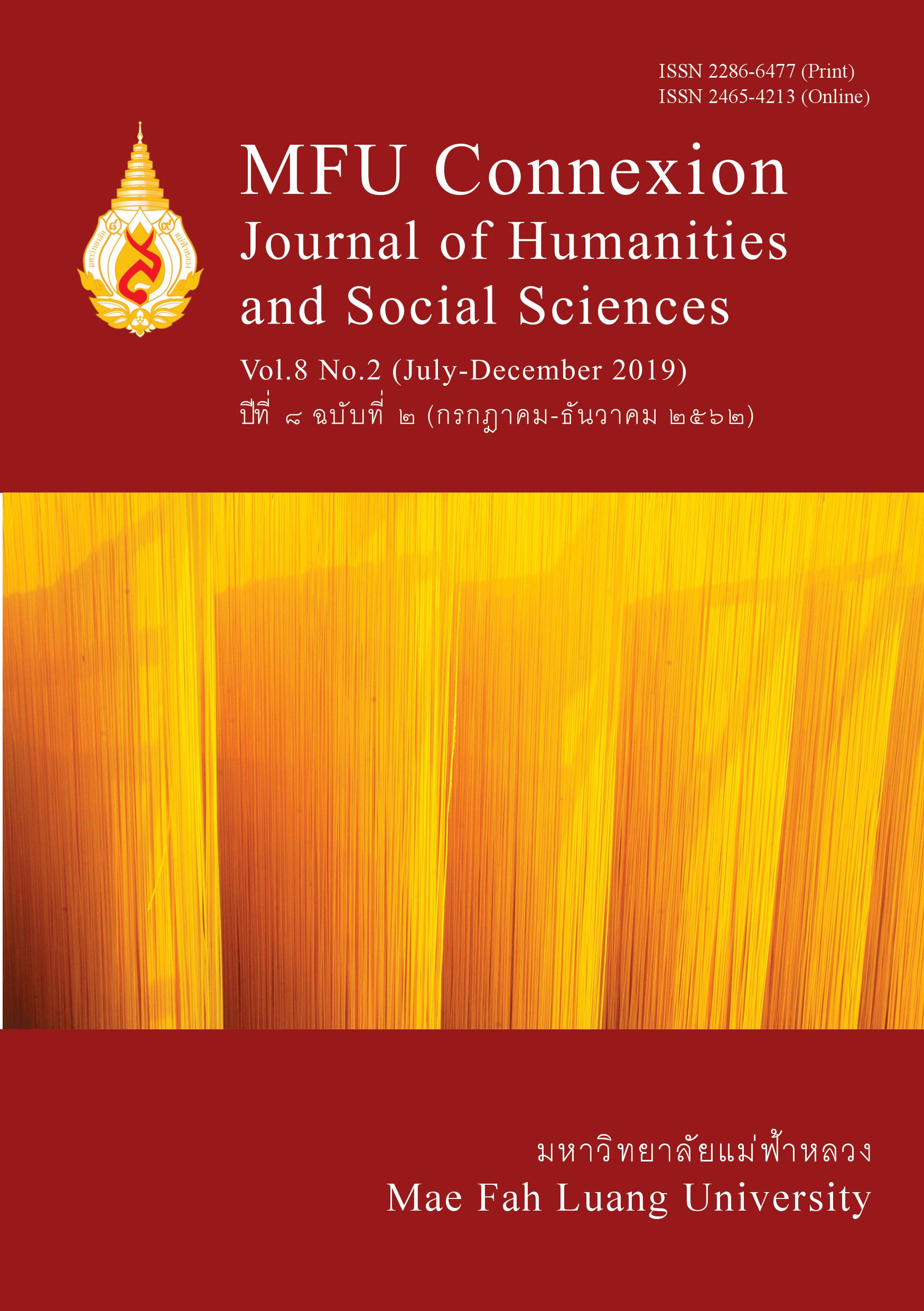The Impact of Accounting Ethics on Ethical Behaviors and Decision Making of Accounting Firm Executives in Thailand
Main Article Content
Abstract
Accounting ethics are the essential principles that accounting professionals choose to abide by to enhance their profession, preserve public trust, and reveal honesty and fairness. Proper ethics and ethical behavior are tremendously crucial in accounting for a variety of decisions. This study aimed to investigate the impact of accounting ethics on ethical behaviors and decision making of accounting firm executives in Thailand. A quantitative methodology was used to study a sample of 220 accountants of 122 accounting firms. A questionnaire with the reliability of .96 was used as the tool for collecting data. Data were analyzed by using descriptive statistics and structural equation modeling analysis for testing hypotheses. The results showed that the hypothesized model and the data was right consistent. The impact of the variables in the hypothesized model was as follows: (1) accounting ethics directly influenced ethical behaviors, with a path coefficient of .86; (2) accounting ethics directly influenced decision making, with a path coefficient of .35, and indirectly influenced decision making via ethical behaviors, with a path coefficient of .55; (3) ethical behaviors directly influenced decision making, with a path coefficient of .64. The findings can be used as a guideline for improving and developing accounting firm executives in terms of accounting ethics, ethical behaviors, and decision making, which will affect the operation to get reliable accounting and financial results.
Article Details
Copyright
Connexion: Journal of Humanities and Social Sciences has an exclusive right to publish the accepted articles in any form. However, the author retains the following rights:
1. The right to the ownership of the article;
2. The right to use all or part of the article in his/her other works;
3. The right to re-produce the article for personal use or for use in the author’s organisation, in which case the author must obtain permission from Connexion: Journal of Humanities and Social Sciences;
4. The right to make copies of all or part of the work for educational use or for the author’s use in classroom teaching; and
5. The right to include the work (both the preprinted and printed versions) in an institutional repository.
References
Alnasser, N., et al. (2014) The impact of accounting ethics in improving managers' behavior and decision making in the Jordanian companies, British Journal of Economics, Management & Trade, vol. 4, no. 9, pp. 1441-1456.
Browne, M., & Cudeck, R. (1993) ‘Alternative ways of assessing model fit’, in K. A. Bollen & J. S. Ling (Eds.), Testing structural equation models, Beverly Hill, CA: Sage.
Byrne, B. M. (2001) Structural equation modeling with AMOS basic concept, application, and programming, New Jersey: Lawrence Erlbaum Associate.
Cronbach, L. J. (1951) Coefficient alpha and the internal structure of tests, Psychometrika, vol. 16, no. 3, pp. 297-334.
Chantudom, W. (2014). Effects of quality performance towards the achievement of the organization's accounting office in the Northeast (ผลกระทบของคุณภาพการปฏิบัติงานที่มีต่อความสำเร็จขององค์กรของสำนักงานบัญชีในเขตภาคตะวันออกเฉียงเหนือ), Mahasarakham, Thailand: Mahasarakham University. (in Thai)
Charoensawang, A. (2012). Relationship between operational quality and excellent service of accounting offices in the northeastern region (ความสัมพันธ์ระหว่างคุณภาพการดำเนินงานกับการบริการที่เป็นเลิศของสำนักงานบัญชีในเขตภาคตะวันออกเฉียงเหนือ), Master’s thesis, Mahasarakham University. (in Thai)
Department of Business Development (DBD). (2018) Quality accounting office that is certified quality accounting office according to the accounting firm's certification requirements (สำนักงานบัญชีคุณภาพที่ผ่านการรับรองคุณภาพสำนักงานบัญชีตามข้อกำหนดการรับรองคุณภาพสำนักงานบัญชี), Available: https://www.dbd.go.th/ewt_news.php?nid=5303/ไฟล์.XLS [10 December 2018] (in Thai)
Ibidunni, O. M., et al. (2018) Accounting ethics and the performance of accounting firms in Lagos, Nigeria, Journal of Finance and Marketing, vol. 2, no. 2, pp. 10-16.
Jackling, B., et al. (2007) Professional accounting bodies' perceptions of ethical issues, causes of ethical failure and ethics education, Managerial Auditing Journal, vol. 22, no. 9, pp. 928-944.
Kline, R. B. (2005) Principle and practice of structural equation modeling, New York: The Guilford Press.
Lennick, D., & Kiel, F. (2005) Moral Intelligence: Enhancing business performance and leadership success, Upper Saddle River, NJ: Prentice Education Wharton School Publishing.
Lennick, D., & Kiel, F. (2011) Moral intelligence 2.0: Enhancing business performance and leadership success in turbulent times, Upper Saddle River, NJ: Prentice-Hall.
Loeb, S. E. (1991) The evaluation of outcomes of accounting ethics education, Journal of Business Ethics, vol. 10, no. 2, pp. 77-84, doi: 10.1007/BF00383611
Needles, B. E., et al. (1999) Principles of accounting, 7th edition, Boston: Houghton Mifflin.
Phongthani, P. (2008). Factors affecting the quality of services of accounting firms in the country (ปัจจัยที่ส่งผลกระทบต่อคุณภาพการบริการของสำนักงานบัญชีในประเทศไทย), Sutti Paritut, vol. 22, no. 67, pp. 17-36. (in Thai)
Sanchai, S., et al. (2017) Effects of modern accounting professional ethics on job success of cooperatives auditors in northeast (ผลกระทบทางจริยธรรมของวิชาชีพบัญชีสมัยใหม่ที่มีต่อความสำเร็จในการปฏิบัติงานของผู้สอบบัญชีสหกรณ์ในเขตภาคตะวันออกเฉียงเหนือ), Journal of Accounting and Management, Mahasarakrm University, vol. 9, no. 3, pp. 58-68. (in Thai)
Schumacker, R. E., & Lomax, R. G. (2004) A beginner's guide to structural equation modeling, 2nd edition, New Jersey: Lawrence Erlbaum Associates.
Solano, H. O. (2018) Accountant’s professional behavior and its effect on decision-making process in the companies, Colombia: Consulting Partner Auren.
Srichanpetch, S. (2009) Business ethics and good governance (จริยธรรมทางธุรกิจกับธรรมาภิบาล), Journal of Business Administration, vol. 32, no. 123, pp. 1-6. (in Thai)
Stevens, J. (1986) Applied multivariate statistics for the social sciences, Hillsdale, NJ: Lawrence Erlbaum Associates.
Tanner, C., & Christen, M. (2014) ‘Moral Intelligence – A framework for understanding moral competences’, in M. Christen et al. (Eds.), Empirically informed ethics: morality between facts and norms, pp. 119-136, Zurich, Switzerland: Springer International Publishing.
Thailand Federation of Accounting Professions (TFAC). (2013) Explanation of the regulations of the federation of accounting professions (No. 19) regarding the ethics of the professional accountants 2010 (คำชี้แจงข้อบังคับสภาวิชาชีพบัญชี (ฉบับที่ 19) เรื่อง จรรยาบรรณของผู้ประกอบวิชาชีพบัญชี พ.ศ. 2553), Available: tfac.or.th/upload/9414/OzmzikNLfQ.pdf [15 October 2018] (in Thai)
Thipwiwatpotjana, S. (2017). Factors of standard on quality control affecting to the success of accounting firms in Thailand (ปัจจัยของมาตรฐานการควบคุมคุณภาพที่มีผลต่อความสำเร็จของสำนักงานบัญชีในประเทศไทย), Journal of the Association of Researchers, vol. 22, no. 2, pp. 52-64. (in Thai)


